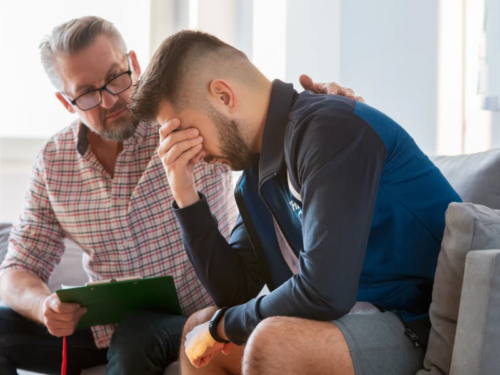
Table of Contents
Ready to start your journey?
Group Therapy for Trauma: Is It Effective?
Written By: Charlie Health Editorial Team

Clinically Reviewed By: Dr. Don Gasparini
May 31, 2023
7 min.
Trauma-informed group therapy provides trauma survivors with a chance to share their experiences with others who understand what they've been through.
Learn more about our Clinical Review Process
Table of Contents
Ready to start your journey?
8 benefits of group therapy for trauma survivors
Group therapy can offer numerous benefits for trauma survivors. Here are eight advantages of group therapy specifically tailored for trauma survivors:
1. Validation and understanding
Group therapy provides a space where trauma survivors can share their experiences with others who have gone through similar challenges. This validation and understanding from fellow group members can help survivors feel less alone and more affirmed in their emotions and reactions.
2. Support network
Group therapy creates a supportive network of individuals who can provide empathy, encouragement, and support throughout the healing process. Building connections with others who have experienced trauma can be incredibly comforting and reassuring.
3. Shared experiences and insights
Hearing others’ stories and perspectives can offer new insights and alternative ways of thinking about one’s own trauma. This shared experience can broaden survivors’ understanding of their own journey and provide valuable lessons and coping strategies.
4. Reduction of isolation and shame
Trauma can often lead to feelings of isolation and shame. Group therapy provides a safe environment where survivors can express their thoughts and emotions without fear of judgment. Connecting with others who have had similar experiences can alleviate shame and foster a sense of belonging.
5. Learning from others’ progress
Witnessing the growth and progress of fellow group members can inspire and motivate trauma survivors in their own healing journey. Seeing others overcome challenges and develop resilience can instill hope and optimism.
6. Emotional expression and processing
Group therapy allows trauma survivors to express and explore their emotions in a supportive setting. Sharing their feelings with others who can relate can be cathartic and can facilitate the process of emotional healing and resolution.
7. Development of coping skills
Group therapy often incorporates the teaching and practice of coping skills specifically designed for trauma survivors. Participants can learn techniques to manage symptoms, regulate emotions, and promote self-care. Sharing personal coping strategies within the group can create a rich resource of practical tools.
8. Empowerment and growth
Engaging in group therapy can empower trauma survivors to take an active role in their healing process. By participating in group discussions, sharing their experiences, and supporting others, survivors can develop a sense of agency, regain control over their lives, and experience personal growth.
How does group therapy help individuals with PTSD and trauma?
Research has shown that group therapy can be a valuable treatment approach for individuals with post-traumatic stress disorder (PTSD) and trauma-related experiences. Here are some ways in which group therapy can help people with trauma:
Support and validation
Group therapy provides a supportive and understanding environment where individuals with similar experiences can come together and share their stories with the support of a mental health clinician. This sense of belonging and validation can be powerful in helping individuals with trauma feel understood and less alone in their struggles.
Normalizing symptoms
Trauma symptoms can be distressing and isolating. In a group therapy setting, individuals can learn that their symptoms are common reactions to trauma and not personal weaknesses. This normalization helps reduce self-blame and shame, allowing individuals to accept their experiences and focus on healing.
Emotional expression and processing
Group therapy offers a safe space for individuals to express their emotions related to trauma with the support of a mental health clinician. Sharing these feelings with others who understand can be cathartic and can facilitate the healing process. The group can also provide feedback and support as individuals navigate their emotional challenges.
Skills-building
Group therapy often incorporates psychoeducation and skills-building components. Participants can learn coping strategies, relaxation techniques, and effective ways to manage symptoms from the facilitator. Group members can also share their personal strategies, providing a rich pool of knowledge and resources.
Empowerment and resilience
Witnessing others’ progress and growth in the group can inspire individuals with trauma to believe in their own ability to heal and recover. By witnessing the resilience of others, individuals can develop a sense of hope and motivation for their own journey.
Social skills and relationships
For many individuals,trauma can impact their ability to trust and form healthy relationships. Group therapy allows for the development of social skills, fostering positive interactions with others and building trust in a safe environment.
Group therapy may not be suitable for everyone and is often used in combination with individual therapy and other treatments. Each person’s needs and preferences should be considered when determining the most appropriate treatment approach.

Can you use DBT in group therapy?
Different kinds of treatment methods can be effectively used in group therapy settings, including dialectical behavior therapy (DBT). DBT is a therapeutic approach that combines elements of cognitive behavioral therapy (CBT) with mindfulness and acceptance-based strategies. It was initially developed to treat individuals with borderline personality disorder but has since been found to be beneficial for a range of mental health conditions.
In a group therapy setting, DBT can provide several advantages:
Skills training
DBT emphasizes the development of specific coping skills to help individuals regulate their emotions, tolerate distress, improve interpersonal effectiveness, and cultivate mindfulness. Group therapy can provide a structured and supportive environment to teach and practice these skills.
In group therapy, individuals can also see how others apply DBT skills in their lives, providing inspiration and modeling for new ways to use those skills. Hearing success stories and challenges from group members can help individuals identify new strategies and solutions for their own difficulties.
Validation and support
DBT recognizes the importance of validation and support in therapy. In a group setting, individuals can share their experiences, provide empathy and validation to one another, and receive support from group members who understand their challenges.
Role-playing and problem-solving
Group therapy offers opportunities for role-playing and problem-solving exercises. Participants can practice interpersonal skills, such as assertiveness and conflict resolution, within the safety of the group. They can also collaborate in finding effective solutions to real-life challenges and receive feedback from both the therapist and other group members.
Peer support and accountability
Group therapy provides a supportive network of peers who can offer encouragement, celebrate successes, and hold one another accountable for using DBT skills outside of therapy sessions. This peer support can enhance motivation and provide a sense of belonging.
Group therapy in intensive outpatient programs
Group therapy is commonly incorporated into intensive outpatient programs (IOPs) for mental health and substance use treatment. IOPs are structured treatment programs that offer a higher level of care than traditional outpatient therapy while still allowing participants to reside in their homes or communities. Here’s how group therapy is typically utilized in IOPs:
Core component
Group therapy is often a core component of IOPs, with participants attending multiple group sessions per week. These therapy groups provide a supportive and structured environment where individuals can engage in therapeutic activities, receive psychoeducation, and participate in group discussions.
Peer support
Group therapy in IOPs allows participants to connect with peers who are facing similar challenges. This peer support can be a valuable source of encouragement, validation, and empathy. Sharing experiences and hearing from others can help individuals feel less isolated and more motivated in their recovery journey.
Skills-building and psychoeducation
Group therapy sessions in IOPs often focus on teaching practical skills and providing psychoeducation relevant to participants’ specific needs. These skills may include coping strategies, relapse prevention techniques, stress management techniques, communication skills, and problem-solving skills. Participants can learn from the therapist and also from the experiences and insights shared by other group members.
Emotional expression and processing
Group therapy provides a safe and supportive space for participants to express and process emotions related to their mental health or substance use challenges. The group dynamic can facilitate the exploration and understanding of personal experiences, as well as provide feedback, support, and alternative perspectives.
Accountability and feedback
In group therapy, participants can hold each other accountable for their progress and commitment to recovery. Group members can provide feedback, challenge negative patterns or beliefs, and offer insights based on their own experiences. This collective feedback can be instrumental in promoting growth and self-reflection.
Relapse prevention and aftercare planning
Group therapy sessions in IOPs often address relapse prevention strategies and assist participants in developing aftercare plans. This can include identifying triggers, developing coping skills, establishing support networks, and creating a plan for continued recovery after completing the IOP.
Community-building and normalization
Group therapy in IOPs helps create a sense of community among participants. By engaging with others who are on a similar journey, individuals can normalize their experiences, reduce stigma, and develop a support system beyond the therapy sessions. This sense of community fosters social connection, accountability, and a shared commitment to recovery.
Charlie Health’s trauma group offerings
Whether you’re seeking mental health treatment for a diagnosed mental health condition or looking to improve your mental wellness, group therapy can be a valuable component of your treatment plan.
At Charlie Health, we provide virtual mental health treatment for adolescents, young adults, and families experiencing mental health crises. Our comprehensive intensive outpatient treatment program combines supported groups, individual therapy, and family therapy to jumpstart the healing process.
Our virtual model allows us to form group therapy sessions based on unique symptoms, diagnoses, and life circumstances. This is a trailblazing method in clinical practice that allows patients to relate more closely to one another, leading to higher rates of recovery and healing. Our compassionate, experienced mental health professionals will meet you where you are so you can start feeling better. Get started today.
References
https://www.ncbi.nlm.nih.gov/pmc/articles/PMC3705500/





